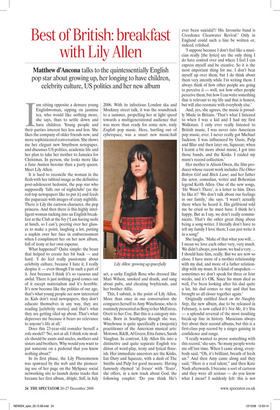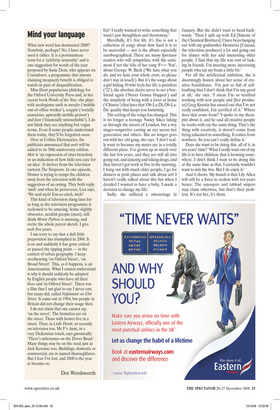Best of British: breakfast with Lily Allen
Matthew d’Ancona talks to the quintessentially English pop star about growing up, her longing to have children, celebrity culture, US politics and her new album Iam sitting opposite a demure young Englishwoman, sipping on jasmine tea, who would like nothing more, she says, than to settle down and have children. Young people and their parties interest her less and less. She likes the company of older friends now, and more sophisticated conversation. She shows me her elegant new Smythson notepaper, and discusses US politics, academic life and her plan to take her mother to Jamaica for Christmas. In person, she looks more like a Jane Austen heroine than a party queen. Meet Lily Allen.
It is hard to reconcile the woman in the flesh with her tabloid image as the definitive post-adolescent hedonist, the pop star who supposedly ‘falls out of nightclubs’ (as the red-top newspapers like to put it) and feeds the paparazzi with images of crazy nightlife. There is Lily the cartoon character, the pop princess. And then there is this highly intelligent woman tucking into an English breakfast at the Club at the Ivy (‘I am having sushi at lunch, so I can’), peering over her glasses to make a point, laughing a lot, putting a napkin over her face in embarrassment when I compliment her on her new album, full of irony at her own expense.
What happened? Quite simple: the beast that helped to create her bit back — and hard. ‘I do feel really passionate about celebrity culture, because I hate it, I really despise it — even though I’m such a part of it. Just because I think it’s so vacuous and awful. There is just nothing good comes out of it except materialism and it’s horrible. It’s now become like the politics of our age, that’s what young people are now interested in. Kids don’t read newspapers, they don’t educate themselves in any way, they are reading [celebrity stories] and that’s what they are getting riled up about. That’s what depresses me because it bears no relevance to anyone’s life at all.’ Does this 23-year-old consider herself a role model? ‘No, not at all. I think role models should be aunts and uncles, mothers and sisters and brothers. Why would you want to put someone on a pedestal that you know nothing about?’ In its first phase, the Lily Phenomenon was spawned by the web and the pioneering use of her page on the MySpace social networking site to launch demo tracks that became her first album, Alright, Still, in July 2006. With its infectious London ska and Mockney street talk, it was the soundtrack to a summer, propelling her at light speed towards a multigenerational audience that was more than ready for some new, truly English pop music. Here, hurtling out of cyberspace, was a smart new music-hall act, a sarky English Rose who dressed like Mari Wilson, smoked and drank, and sang about pubs, and cheating boyfriends, and her brother Alfie.
This, I submit, is the point of Lily Allen. More than once in our conversation she compares herself to Amy Winehouse, who is routinely presented as Borg to her McEnroe, Ovett to her Coe. But this is a category mistake. Born in Southgate though she was, Winehouse is quite specifically a (majestic) practitioner of the American musical arts: Motown, R&B, Al Green, Etta James, Sarah Vaughan. In contrast, Lily Allen fits into a distinctive and quite separate English tradition of word-play, irony and lyrical flourish. Her immediate ancestors are the Kinks, Ian Dury and Squeeze, with a dash of The Smiths and Pulp for good measure. Having famously rhymed ‘al fresco’ with ‘Tesco’, she offers, in a new track about God, the following couplet: ‘Do you think He’s ever been suicidal?/ His favourite band is Creedence Clearwater Revival.’ Only in England could such a line be written or, indeed, relished.
‘I suppose because I don’t feel like a musician really [the lyrics] are the only thing I do have control over and where I feel I can express myself and be creative. So it is the most important thing for me. I don’t beat myself up over them, but I do think about them very intently while I’m writing them. I always think of how other people are going to perceive it — well, not how other people perceive them, but how I can write something that is relevant to my life and that is honest, but will also resonate with everybody else.’ And, yes, she agrees, the music is proudly Made in Britain. ‘That’s what I listened to when I was a kid and I had my first Walkman. I only ever really listened to British music, I was never into American pop music, ever. I never really got Michael Jackson. I was influenced by Oasis, Pulp and Blur and then later on, Squeeze; when I learnt a bit more about music, I got into those bands, and the Kinks. I raided my mum’s record collection.’ Her mother is Alison Owen, the film producer whose recent work includes The Other Boleyn Girl and Brick Lane; and her father the actor, comedian, writer and Bohemian legend Keith Allen. One of the new songs, ‘He Wasn’t There’, is a letter to him. Does he like it? ‘We don’t talk about our feelings in our family,’ she says. ‘I wasn’t actually there when he heard it. His girlfriend told me he cried so he must have. I think he’s happy. But as I say, we don’t really communicate. That’s the other great thing about being a song-writer. I literally don’t have to tell my family I love them, I can just write it in a song!’ She laughs. ‘Make of that what you will... I mean we love each other very, very much. We didn’t always, you know, we had a very... I should hate him, really. But we are now so close. I have more of a mother relationship with my dad, and more of a father relationship with my mum. It is kind of unspoken — sometimes we don’t speak for three or four weeks, and it’s OK. Since his mum died as well, I’ve been looking after his dad quite a lot, his dad comes to stay and that has brought us all closer together again.’ Originally entitled Stuck on the Naughty Step, the new album, due to be released in February, is now called It’s Not Me, It’s You — a splendid reversal of the most insulting break-up line in history. Musicians always fret about their second albums, but this is a first-class pop record by a singer gaining in confidence and range.
‘I really wanted to prove something with this record,’ she says. ‘So many people wrote me off last time. When I came along, everybody said, “Oh, it’s brilliant, breath of fresh air.” And then Amy came along and they said, “Here is a real talent,” and then Kate Nash afterwards. I became a sort of cartoon and they were all serious — do you know what I mean? I suddenly felt: this is not fair! I really wanted to write something that wasn’t just thoughtless and throwaway.’ Mercifully, It’s Not Me, It’s You is not a collection of songs about how hard it is to be successful — nor is the album especially autobiographical. There are many Spectator readers who will sympathise with the sentiment if not the title of her song ‘F*** You’, about George W. Bush (‘We hate what you do, and we hate your whole crew, so please don’t stay in touch’). But it’s the songs about a girl hitting 30 who feels her life is pointless (‘22’), the absolute desire never to see a boyfriend again (‘Never Gonna Happen’) and the simplicity of being with a lover at home (‘Chinese’) that have that ‘Ob-La-Di, Ob-LaDa’ quality that keeps you humming.
The setting of the songs has changed. This is no longer a teenage Nancy Sikes taking us through the streets of London, but a wry singer-songwriter casting an eye across her generation and others. She no longer goes out with her old gang, she says. ‘I don’t really want to because my mates are in a totally different place. I’ve grown up so much over the last few years, and they are still all into going out, and dancing and taking drugs, and they haven’t got work at five in the morning. I hang out with much older people, I go for dinners at posh places and talk about art! I haven’t really talked about this but when I decided I wanted to have a baby, I made a decision to change my life.’ Sadly, she suffered a miscarriage in January. But she didn’t want to head backwards. ‘Then I split up with Ed [Simons of the Chemical Brothers]. I have been hanging out with my godmother Henrietta [Conrad, the television producer] a lot and going out for dinner with her and interesting older people. I find that my life was sort of lacking in friends. I’m meeting more interesting people who tax my brain a little bit.’ For all the intellectual ambition, she is disarmingly honest about her sense of creative fraudulence. ‘I’m just so full of selfloathing that I don’t think that I’m any good at all,’ she says. ‘I mean I’m so terrified working with new people and [her producer] Greg Kurstin has sussed out that I’m not really confident, I’m terrified of it.’ Where does that come from? ‘I spoke to my therapist about it, and he said all creative people he works with say the same thing. That’s the thing with creativity, it doesn’t come from being educated in something. It comes from nowhere. So you can’t really define it.’ Does she want to be doing this, all of it, in ten years’ time? ‘What I really want out of my life is to have children, that is looming somewhere. I don’t think I want to be doing this at the same time as that, I certainly wouldn’t want to mix the two. But I do enjoy it.’ And it shows. My hunch is that Lily Allen will still be a force to reckon with ten years hence. The naysayers and tabloid snipers may claim otherwise, but that’s their problem. It’s not her, it’s them.























































































































 Previous page
Previous page